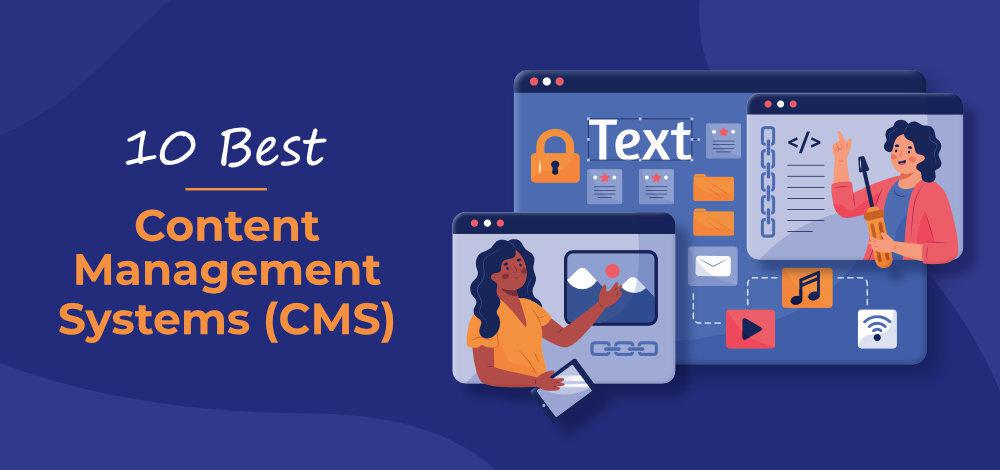Suppose you are buying earphones from an E-commerce website. Or maybe read about which earphones are the best from a blog. Or even just check out the official website of the earphone company. Chances are high that each of these websites was created using a Content Management System! That’s the popularity of CMS! Many companies prefer to use a content management system to create their websites. And that’s why this article tells you the most popular content management systems now so that you can make an informed choice about using one of them.

What is a CMS Platform?
What is a Content Management System you ask? Well, a CMS is an application that allows people without any advanced technical knowledge to create and maintain websites without writing code from scratch. You can create any website you want including an E-commerce website, blog, personal website, etc. with any layout and design you prefer. Obviously, this makes content management systems very popular. In fact, 37% of all the websites on the internet use WordPress, which is the most popular CMS.
So now, let’s check out the top content management systems to consider in the year 2022 and beyond and understand their pros and cons. Then you can make a decision about which CMS you prefer and want to use for your website.
List of 10 Best Content Management Systems (CMS):
1. WordPress
WordPress.org is the most popular content management system in the world currently. Keep in mind that wordpress.org is different from wordpress.com which is a platform to host your blogs. While WordPress.org also started as just a platform for creating blogs and now it has become a CMS for websites, blogs, online stores, and basically whatever else you want! Another good thing is that it is specially designed with search engine optimization with many plugins that also help. It also has a large community of users all over the world so it is easy to get any help that you need along the way. WordPress is also a free CMS but you do require a domain name and a hosting account with a web host to run WordPress which together cost around $25 per year. However, one disadvantage of WordPress is that it leaves the security of your website and the task of regularly backing it up to you without any help.
2. Drupal
Drupal is a frequently used content management system that is behind websites in industries like education, eCommerce, entertainment, sports, journalism, etc. It has more than a million subscribers with many plugins and additional modules to extend its functionality. Drupal is a great option for developers as it has a steep learning curve like Joomla which does not make it ideal for beginners. However, its plus points are that it offers its user’s website support, security features, custom website options, scaling, content authoring, wider accessibility, marketing automation, etc. which are not common in beginner-friendly CMSs. Drupal is also a free and open-source content management system like WordPress and Joomla but it can only be custom designed by a developer because of its complexities. That may make using it for a website pretty expensive because of the customization charges.
3. Joomla
Joomla is also a very popular content management system that is almost as old as WordPress. This is a diverse CMS with a wide variety of features for creating websites and thousands of extensions. Because of its complexity, Joomla is ideal for experienced programmers who want to create websites for specific requirements and not something generic. However, it is not such a good option for beginners who might get overwhelmed by its steep learning curve and abundance of options! The good news is that Joomla provides a detailed user manual and video training classes if you want to learn it in depth. There is also a large community of users that can help you out if there are any issues. Some additional costs might include extensions if you want to add extra functionality to your website.
4. BigCommerce
BigCommerce is a Content Management System that is specifically targeted toward eCommerce companies (as the name implies!) It is an open SaaS platform that provides multiple templates to create your custom Ecommerce site. It also provides custom checkout pages with flexible APIs and support for Google Cloud. BigCommerce also provides customer support in case you run into any problems. You can access this using Email, chat, phone, etc. Ecommerce websites using BigCommerce are quite flexible in their payment methods as well with support for credit and debit cards along with PayPal, Amazon Pay, Apple Pay, etc. However, all these facilities are not free with the Standard plan costing $29.95/month and the Pro plan costing $299.95/month. You can also avail of the standard plan only till your online sales are below $400k/year and if they become more, you have to pay additional charges or upgrade the plan.
5. Shopify
Shopify is also a content management system for e-commerce sites like BigCommerce. It is very easy to create websites using Shopify as it provides an intuitive interface with support for extensions, hosting, backups, etc. There are also many third-party extensions that you can buy to add extra features to your website. Another advantage of Shopify is that it also provides options for credit and debit cards along with PayPal, Amazon Pay, Apple Pay, etc. If you have a real-world store apart from your online store, then Shopify also provides options for in-store sales. In case of any problems, you can access customer support using email, chat, phone, Twitter, etc. But Shopify is not free with the Basic plan costing $29/month and the Advanced plan costing $299/month.
6. Wix
Wix is a perfect content management system for beginners. It offers an intuitive drag-and-drop interface with multiple templates that beginners can use to create the website they want. All these are interactive templates that provide a great look and function for the website both on computer and phone screens. You can also customize your website and optimize it for SEO so that it gets maximum visibility. However, once you select a template on Wix, you cannot change it later even if you want to. Wix offers free sites but these have a Wix domain name and ads running. It is also not possible to create eCommerce sites using this free plan. The paid plans start from the Combo for personal use from $125 per month until the VIP plan at $325 per month.
7. Squarespace
Squarespace is a content management system you can use to create your online presence in the form of a website. You can select any website template and third-party extensions that are necessary for your website. Squarespace is so popular among bloggers, musicians, entrepreneurs, etc. because of its ease of usage and its simple drag-and-drop interface. It is comparatively very easy to create websites using this CMS as it provides all the components for a website like its domain name, SSL certificate, web hosting, etc. on a single platform. There are other options such as themes that can be changed using CSS if required. However, all these facilities come with a cost. Squarespace is not free with its personal plan costing around $12 per month. Its business is even more expensive at $18 per month however it provides additional features with the price.
8. Ghost
If you are a blogger then Ghost is the best CMS for you. It is often called “Headless CMS” due to the policy of not forcing to publish content in a specific manner. The data which you create can be shown on the website, along with that you can also send it on the mobile application too. People with no technical knowledge can also use Ghost as it is a very easy-to-use and flexible platform. Also, this content management system has a built-in SEO plugin that optimizes the data accordingly. Ghost also allows the changing of content and helps in running online publications for magazines or newspapers.
9. HubSpot CMS
HubSpot is another fully integrated content management system, which is specially designed keeping in mind the business and market owners. In this CMS, you will get all sorts of content management systems, sales, automation, operations, service, and marketing tools making it an ideal solution for developing businesses. It is a very useful management system as it also helps big companies in looking after their website by providing an all-in-one system. One can use HubSpot without or with very less technical skills as it is a very easy-to-use application. Also, if you are a developer, you will find numerous functions such as command line tools, flexible theme options, etc. in order to create a customized effect.
10. Contentful
Contentful is a very known content management platform that is used globally by numerous people for creating, managing, and delivering content. It provides a seamless, and adaptable digital experience across all channels making it one of the best. This particular product has been created for the developers as its cloud-based platform allows the same content to be published around all channels through flexible APIs. Contentful is one of the most popular CMS in organizations due to its engaging omnichannel digital experiences for users. Also, if you are looking for powerful content delivery you can go for this CMS.
CMS Comparison:
Check out the significant comparison between some of the most popular CMS below:
- Wix vs WordPress
- Shopify vs WordPress
- Drupal vs Shopify
- Shopify vs Joomla
- BigCommerce vs Shopify
- BigCommerce vs Squarespace
- Wix vs Shopify
- Drupal vs Squarespace
So, Which Content Management System Should You Choose?
There are many types of content management systems given above. However, you should choose a CMS based on your specific requirements. If you need to create an eCommerce website, then BigCommerce and Shopify are the best options. Otherwise, if you are an experienced developer or can afford to hire a developer, then maybe you should choose Drupal and Joomla. If you are a relative newcomer, then WordPress, Wix, and Squarespace might be better options. It is also important to consider the price of these CMSs. If you need free or very nominally priced options, then WordPress, Drupal, and Joomla are good choices and if you can afford to spend money, then consider BigCommerce, Shopify, Wix, Squarespace, etc. Almost all these content management systems provide support if you are stuck so you don’t need to worry about that. You should just make your choice keeping in mind your content strategy and the type of website you need, couple with your financial condition.




